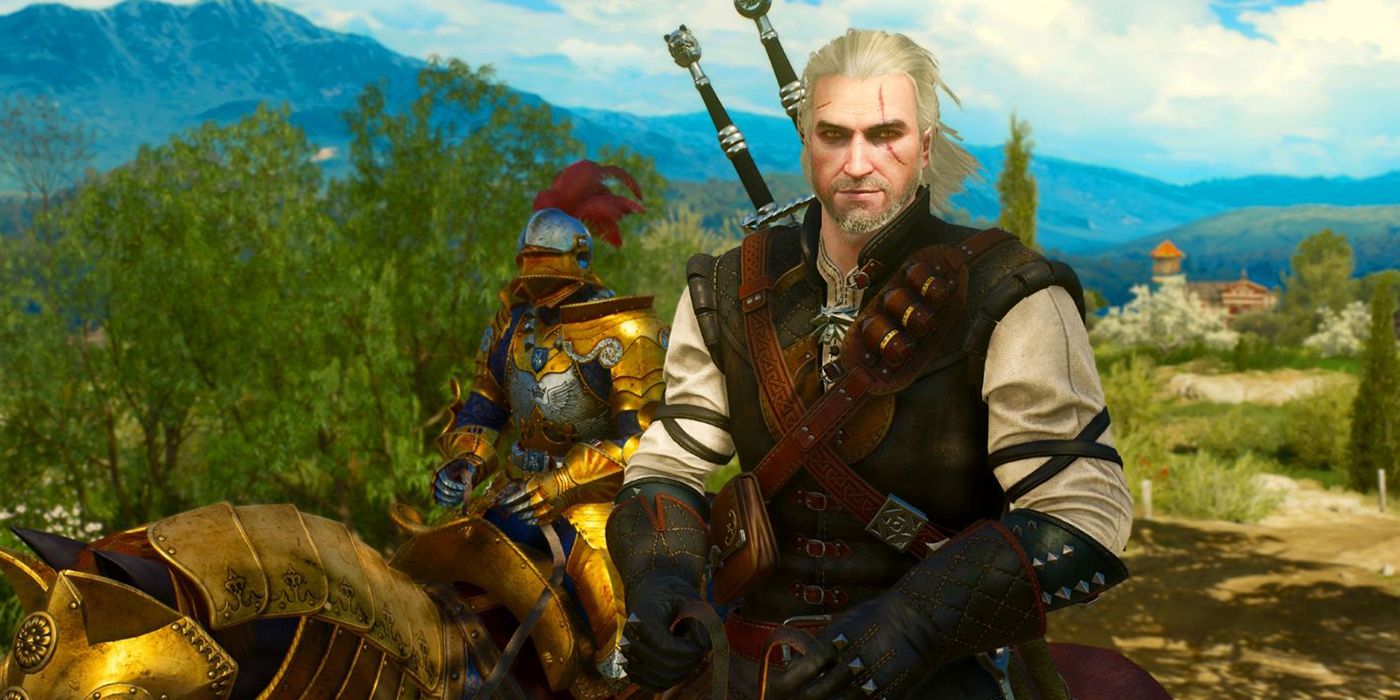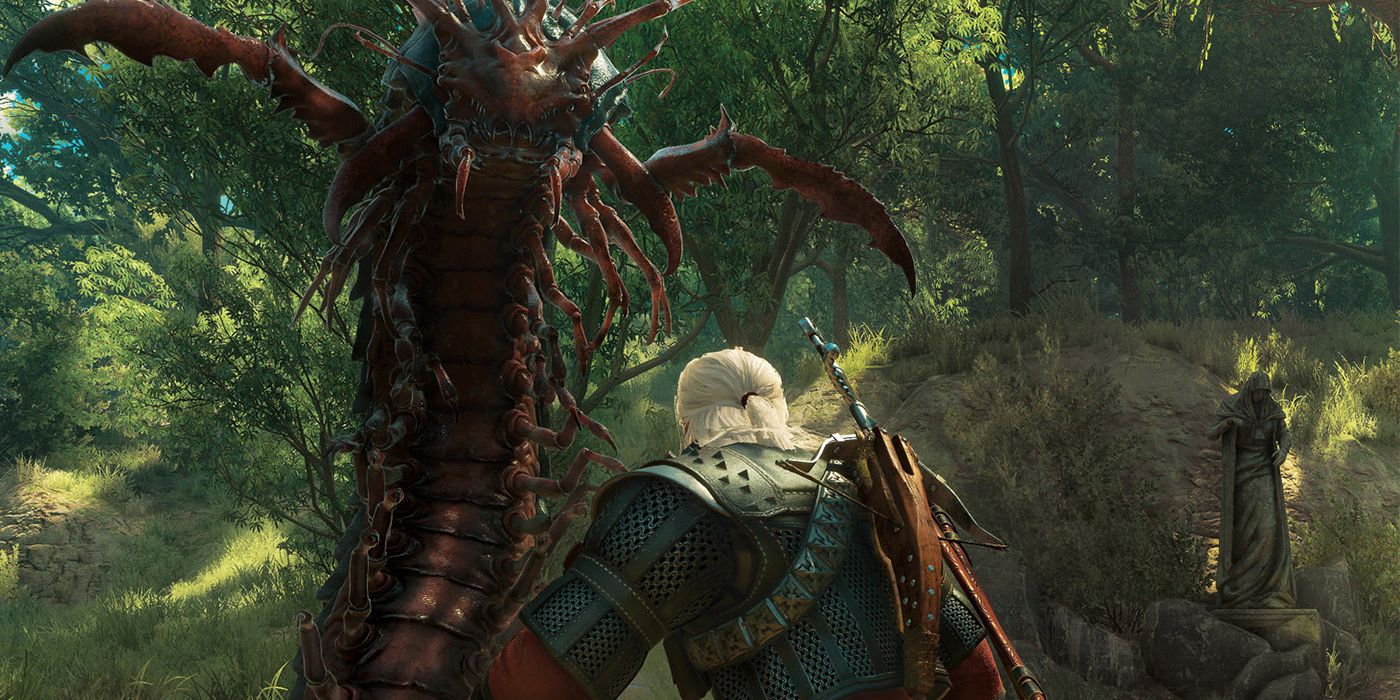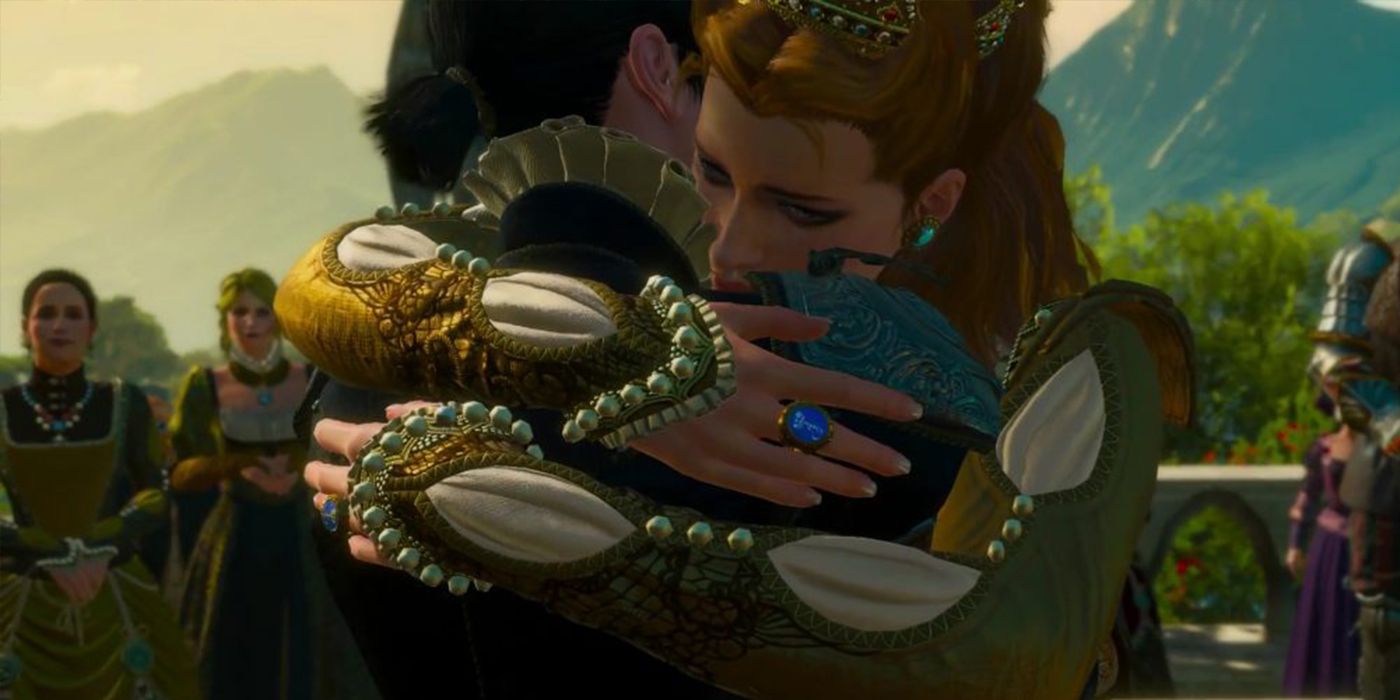Once players complete the base The Witcher 3 game, they may assume the hardest choices are behind them; however, CD Projekt Red made sure that both of its story DLC had the same emotional gravitas as the rest of the game. Generally, players will complete the first DLC, Hearts of Stone, before moving on to the final major DLC released for The Witcher 3: Blood and Wine.
Blood and Wine is quite different from its predecessor in that it takes place in another region altogether, never before explored by players. Geralt leaves the lands of The Witcher 3 and travels to the far-off kingdom of Beauclair to hunt a beast that stalks its citizens, but finds much more than a mere monster when he arrives--and of course, he's forced to make many difficult decisions for the good (or detriment) of humanity.
A Knight's Tales
"A Knight's Tales" may just be a side quest, but it's one of the more complex side quests in Blood and Wine. It begins with a tree weeping blood, and a perplexed woodsman named Jacob looking for answers; through his investigation, Geralt finds that the tree is in fact a woman, Daphne, cursed by a witch and stuck in her current form. As such, there are three possible paths for Geralt to take through this quest: he can try to lift the curse himself without help, ask the witch for her help, or force the witch to help (and there's a pretty major difference between Geralt asking nicely or demanding).
Lifting the curse without help isn't the "best" option, but it's not the worst, either. On this route, Geralt performs a ritual to excise Daphne's spirit from the tree, but without the witch's help, the spirit is not going to go quietly. Upon being freed, Daphne becomes a wraith, which Geralt must then defeat to banish from the world; Jacob won't be happy with what happened, but he'll give Geralt the agreed-upon payment for his services.
Forcing the witch to help is undoubtedly the "worst" ending, as the witch doesn't take kindly to demands. Geralt will have to fight her and force her down to near-death before she'll talk, and then when she performs her part of the ritual, she won't actually free Daphne: instead, Daphne's soul will possess the body of a ferocious wolf which proceeds to tear Jacob to pieces, and Geralt walks away without pay or moral satisfaction.
Naturally, asking the witch for help is the "best" ending for A Knight's Tales; having been approached respectfully, she'll give Geralt the correct instructions to freeing Daphne's spirit, and when the woman is freed from the tree she won't attack as a wraith--merely converse. Geralt can exchange a few words with her before sending Daphne off to her eternal rest, while Jacob will be content with the way the quest played out and happily gives Geralt his money.
La Cage au Fou
"La Cage au Fou" is another of The Witcher 3: Blood and Wine's side quests, and this one is arguably both the creepiest and most interesting of the bunch. Geralt comes to a dilapidated homestead with maddening words scrawled on its walls and spoons, of all things, hanging everywhere in and around the house. There will also be a number of lingering wraiths to defeat, and Geralt soon finds out why: many people have died in this house at the hands of the cursed wight that lives there.
To resolve this quest, Geralt has two choices: he can just kill the wight, or try and end its curse to free the person within. Given how many people have died and the bone-chilling layout of the wight's lair, it may seem like killing the wight is for the best, but lifting its curse actually ends better than most things do in the dark fantasy world of The Witcher 3. When he decides to lift the curse, Geralt deduces that it's a simple matter of voluntarily sitting at the wight's table and sharing a meal with it (sans spoons) until the wight can see its reflection in the bowl's bottom; once that happens, the wight slowly transforms back into the woman it used to be.
So sure, players could kill the wight, but why do that when instead they could get a nice old lady named Marlene to live at Geralt's house and cook meals? Another meal is added daily to a chest in the home, and Geralt can bring them on the road for sustenance. Plus, the quest leads players to a small piece of lore surrounding the malicious merchant Gaunter O'Dimm.
The Night of Long Fangs
Now it's time for the main quests of Blood and Wine, and specifically, the quest called "The Night of Long Fangs." By this point, Geralt and Regis have located the duchess's sister Syanna, and the master vampire Detlaff has realized that she manipulated him into carrying out her revenge; in response, Detlaff unleashes an army of vampires on Beauclair. Once the attack begins, Geralt has two choices: he can try to locate Syanna since she's the object of Detlaff's rage, or instead look for Orianna, another master vampire who could share some valuable knowledge with Geralt.
Regis will urge Geralt to come with him and find Syanna, and it's worth listening to him. Blood and Wine has three basic endings: a "good" ending, a "fair" ending, and a "bad" ending. Should players be determined to get the good ending, they'll need to agree with Regis here and seek out Syanna rather than Orianna. Plus, going after Syanna leads directly to the quest "Beyond Hill and Dale..." which takes players to a strange and wonderfully twisted world filled with classic fairy tales that have been corrupted by time.
So really, it's worth choosing to go after Syanna just for the weird adventures Geralt will get out of it, but it's also the players' path to as happy an ending that The Witcher 3 can provide.
Judge, Jury, Executioner
As Night of the Long Fangs continues, the player will eventually need to have their final showdown with Detlaff, the Beast of Beauclair. Here, a few things can happen: if the player doesn't have Syanna (like Detlaff requested) then he'll fly into a rage and attack regardless, forcing Geralt and Regis to slay him. If Geralt does have Syanna, then either he can let Detlaff kill her or pull a bait and switch, luring Detlaff in to try and get him to talk sense. Unfortunately, there's ultimately no way to talk Detlaff down while Syanna lives; one of them will need to be dead by the time the Night of Long Fangs is over.
Therefore, it's up to players if they'd rather let Detlaff exact his revenge or protect Syanna despite her many faults, as the duchess wishes. Keep in mind that Geralt will also be in a lot of trouble with the duchess Anna Henrietta if he lets her sister die here. Detlaff may have been a reformed vampire before, but Syanna's betrayal has clearly brought out the worst in him and led to a massacre in Beauclair. To get the "good" ending for Blood and Wine, players will need to keep Syanna alive and fight Detlaff to the death. Then again, if players some are looking to make the worst choices possible in their playthrough, then feel free to try another of the routes.
Pomp and Strange Circumstance
Assuming players are following that "good ending" model, they'll get to the quest "Pomp and Strange Circumstance." At this point, Syanna is alive and imprisoned, and Anna Henrietta is preparing to bring her to trial for her crimes. However, there's still a lingering question of who Syanna's final victim was supposed to be, and Geralt will need to agree to look for clues as to who Syanna wants dead. After discovering the truth, he can go up and talk to Syanna, and the following conversations are the final puzzle pieces that determine which ending players will get.
To get through to Syanna, players will need to pick dialogue options that are sympathetic to her woes but also urging her to try forgiving her sister and starting anew. Then at the ceremony (and Syanna's sentencing) Geralt will again need to pick dialogue options that lean toward forgiveness and mercy, telling Anna Henrietta that yes, Syanna's crimes were horrible, but she had reason to feel pain. Should Geralt say the wrong thing, both sisters will end up dead, so if players want to get the best ending possible, they'll need to consider their words wisely.
With that, players should now be ready to navigate the most difficult decisions in Blood and Wine. The Witcher 3 loves to test its players and present them with particularly agonizing choices, so it's not surprising at all that Blood and Wine follows suit with aplomb.
The Witcher 3 is out now for PC, PS4, Switch, and Xbox One.



